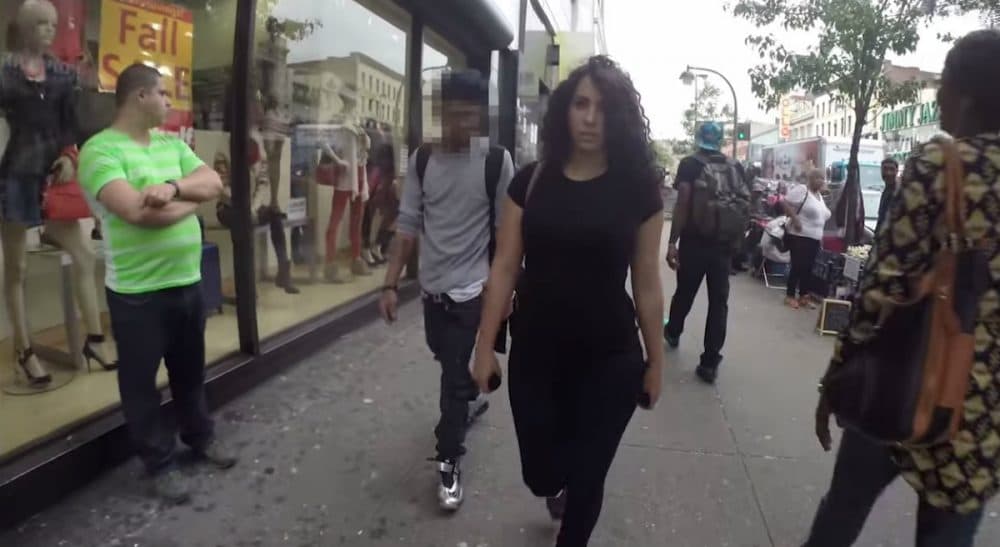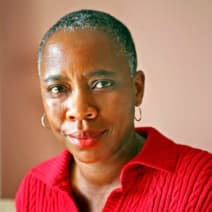Advertisement
Those Catcalls Weren’t For Me — It Was Worse

The dread was immediate, starting almost as soon as I stepped from our front stoop to the sidewalk. My temples would throb. My neck would feel hot. My heart would race, though I was walking much slower than usual. The destination didn't matter. Sometimes we were heading to the subway. On other days, we were running errands to the bank or shoe repair shop. With rare exception, the path was always the same: Just four blocks from home, it was as if we had stepped from the comfort of the neighborhood onto some nefarious planet.
"Hey baby, I like how you wearin' them jeans!"
Some might have misconstrued their commentary about [my mother's] hair or the pleasing color of her outfit as compliments, but to my young ears, everything they said was profane.
"How you doin' honey?"
"Why you walking so fast, ain't you got no time for me?"
Those catcalls weren't for me. They were aimed at my mother.
Few things in my childhood upset me more than the men congregated in front of the grimy tire shop near my house. Regardless of the time of day, there was usually a half-dozen of them on chairs and overturned milk crates, ranging from fairly young to those easily old enough to know better. And unless you crossed the street, there was no way to avoid them; to me, it seemed like they spent more time annoying women than fixing flats.
Still in pigtails, I had yet to learn the word "harassment," and its sad, particular applications when pertaining to women. Yet even then, these men reminded me of those old cartoons where, at the site of a beautiful woman, a man would morph into a howling wolf, his neck elongated, his eyes popping from his head, saliva dripping from his curling lips.
What seemed so funny on a Saturday morning at home lost its humor on the street — these men turned into wild animals at the sight of my mother. Beyond their unwanted terms of what they considered endearment, they never swore at my mother or called her disparaging names. Some might have misconstrued their commentary about her hair or the pleasing color of her outfit as compliments, but to my young ears, everything they said was profane.
Whatever the intention, their words disrespected my mother. I wanted to scream at these men and throw whatever I could find to make them stop. For her part, my mother said nothing. She never acknowledged them with even a vague glance in their direction. Yet, I would always notice the way her shoulders would flex and her hand, usually holding mine, would tense. Sometimes she would squeeze my hand hard enough to hurt, but I willed myself into uncomfortable silence. If squashing my fingers eased this difficult moment for her, it seemed the least I could do. That these stupid thoughtless words could unnerve my mother, so fierce and fearless in so many ways, branded the world as an unpredictable, hostile place.
That was more than four decades ago, and for too many women, the world remains just as hostile and unpredictable, maybe even more so. The secretly-recorded video of a young woman enduring 100 catcalls, in 10 hours, from men on the streets of New York, isn't just the hottest viral sensation. It's a snapshot of what tens of millions of women experience day after day, week after week, year after year. For decades, this behavior has been largely dismissed as harmless; even the milquetoast 1950s hit, "Standing on the Corner" celebrates aimless men who traipse down to Main Street to "review the harem parading there for me" as he's "watching all the girls go by."
Commissioned by Hollaback!, an organization founded to end street harassment, the video has sparked a national dialogue about the ways women are publicly intimidated and verbally harassed. (Sadly, it has also fueled anonymous threats against the actress who was the object of all the unsolicited attention.) Whether this moment will amount to more than click-bait headlines remains to be seen. Yet if regarded with the seriousness it deserves, this may mark the slow beginning of the overdue end to the kind of treatment that my mother — and countless other women — have been subjected to all their lives.
These days, people like to say, "Video, or it didn't happen." Well, now there is video, stark and unassailable. It should prove, once and for all, that anything that can make half the world's population feel threatened and devalued can no longer be considered benign.
Related:

